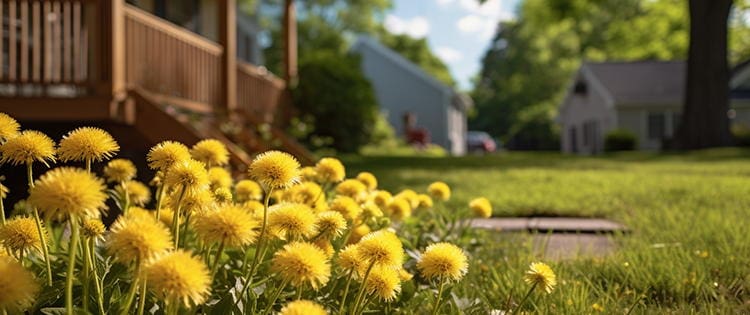Dandelion is a very common plant that lives in temperate North America and practically all around the world. Almost everyone knows dandelions.
The name is French from “dent de lion” meaning tooth of a lion which refers to the shape of the leaves. Most people consider dandelions nuisances; they are seen as weeds because they grow in places like lawns or crop fields where people don’t want them to grow.
However, dandelions* can be very useful for you and your family. From dandelion flower oil and dandelion vinegar to dandelion tea, dandelion soap, and dandelion honey, these are some of my favorite uses that I wanted to pass on to you.
Dandelion Flower Infused Oil
The shelf life of strained dandelion oil is about one year.
This oil is used in recipes to soothe and heal chapped or cracked skin. It can also be used for sore muscles, aches and pains, and sore muscles.
How to make it:
Put dried dandelion flowers in a canning jar, half-full. Cover with sunflower, olive, avocado, jojoba, apricot kernel, or sweet almond oil to the top of the jar.
- For a quick oil infusion: Set the jar down, uncovered, into a saucepan that is filled with a few inches of water. Heat for 2-3 hours over a low burner; make sure the water doesn’t evaporate. Remove from the stove and strain.
- For a slower oil infusion: Cap the jar of dried dandelion flowers mixed with oil (as described above) and store it in a dark, dry cupboard for 4-6 weeks. Shake the jar occasionally. After 4-6 weeks, strain.
- An alternate option for infusion: Set the jar of dandelion flowers and oil on a sunny windowsill. Allow the natural heat from the sun to infuse the mixture for about two weeks. Then strain.
Related: 10 Medicinal Plants You Can Find On Your Homestead
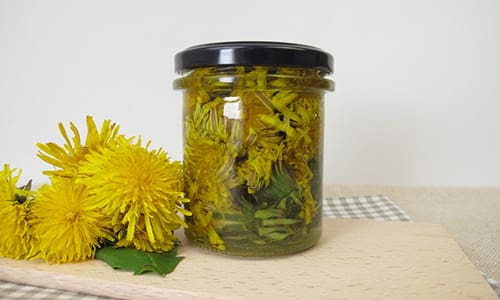
Dandelion Vinegar
To extract the minerals (calcium, potassium, magnesium, and iron) in dandelions, vinegar does the trick! The new mixture of dandelion vinegar can be used as a hair rinse after diluting equal parts of water. And it can be used to help with itchy bug bites. Add one cup of Epsom salts along with one cup of dandelion vinegar to bath water for achy tired muscles.
How to make it:
Pick fresh dandelions, rinse well, and fill a jar but don’t pack too tightly. Next, pour apple cider vinegar over the plant matter until the jar is full. Cover the top of the jar with plastic wrap or wax paper; screw the lid on tightly. Place the covered jar in a dark, dry cupboard for 4-6 weeks. Shake occasionally. Strain before using as described above (e.g., as a hair rinse, a topical for itchy skin, or for sore muscles).
The dandelion vinegar can also be used to make a homemade healthy vinaigrette by combining 3 T of oil, 2 tsp. of dandelion vinegar, 1 T crumbled bacon, ½ T chopped onion, 1 tsp. maple syrup, and salt and pepper to taste. Shake in a jar and let stand for 20-30 minutes. Shake again before pouring (and enjoying) over the salad.
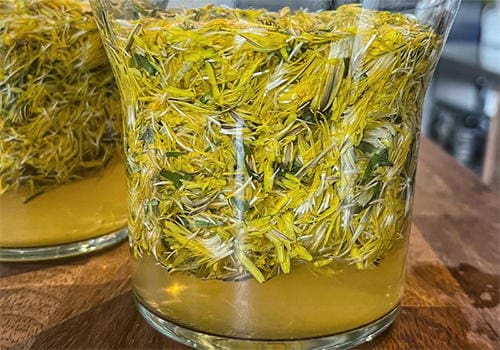
Dandelion Tea
You can take the dandelion flowers and combine them with water to make tea. Dandelion tea is a classic herbal tonic; it will help purify and detox the blood and help with acne and constipation.
How to make it:
Suggested dosage 1-3 cups daily, start with a lower amount as it has laxative and diuretic properties for your body to get used to.
Heat 4½ cups of water in a large saucepan and bring to a boil. In a heat-safe container, place 2 cups of dandelion petals. Pour the boiling water over the petals and stir. Next, cover the container and steep for an hour. Then, strain. Toss out the petals (you can compost them) and keep the tea. It will look yellow.
If you prefer a stronger tea, steep for a longer time. The shade will change to darker yellow. You should have 4 cups of liquid after straining. Pour yourself a cup and enjoy with a touch of lemon, a fresh orange slice, and/or honey.
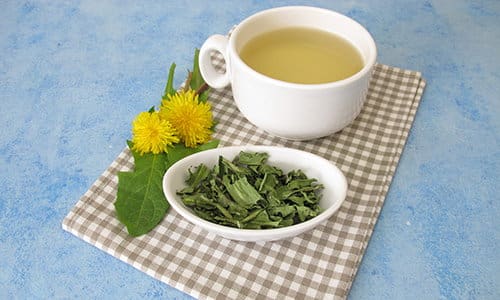
Dandelion Soap
This all-natural easy soap recipe helps soothe the body and relax the mind. The lotion bars also help with cracked dry skin and soreness. Plus, the soap makes a wonderful gift!
How to make it:
Add 10 ounces of the dandelion tea liquid (see preparation for the dandelion tea #3 above), 14 oz. olive oil, 1 oz. coconut oil, 3 oz. sunflower oil, 2 oz. shea butter, 1½ oz. of both jojoba oil and tamanu oil, 1 oz. of lye (sodium hydroxide), and ½ oz. of honey in a crock pot. Heat on low to medium heat.
Watch the soap mixture so it does not crack. If the mixture starts to crack, turn down the heat. This batch will fit a 3-lb. mold, measuring 8″ x 3.5″ x 3.5,″ and yield 7 or 8 bars of soap. For optional color, add 3 tsp. annatto seed powder to make orange or ½ tsp. of annatto seed powder for yellow.
Related: If You Have This Plant in Your Backyard, You Will Never Run Out of Soap
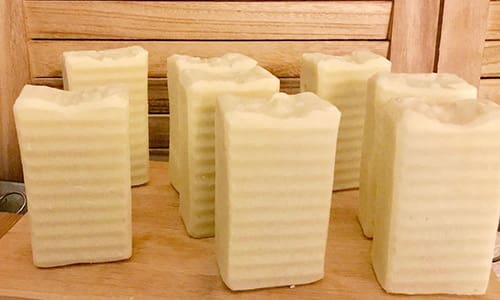
Dandelion-Infused Honey
Raw honey is soothing on the throat and GI tract. It can inhibit the growth of organisms associated with ulcers and may help with seasonal allergies. That’s why so many people use it to preserve foods. It can also be used as a face wash on the skin to help with acne. You could take one to two tablespoons daily.
How to make it:
Pluck the yellow petals off the dandelions and stuff them into a small jar. Slowly, pour raw honey over them and stir with a knife to remove any air bubbles. Allow the mixture to sit in a dark, dry cupboard for several days. Then strain the flowers from the honey by heating the mixture over low heat. Pour out of the crock pot and strain again so the honey liquid is separated by the dandelion flowers. The shelf life is about a year.
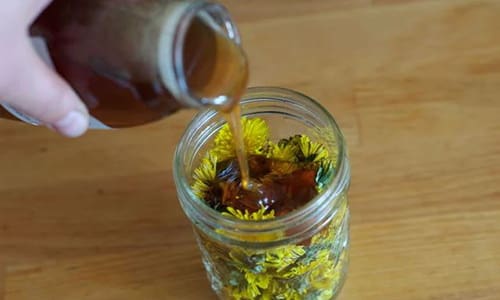
Personal Thoughts About Using Dandelions
After reading this article, you can see that, the dandelion is not always a nuisance. Perhaps you can add to this list of benefits that the dandelion provides.
*Disclaimer: Dandelions are safe for most people to eat, but they are not recommended internally if you have active gallstones or are on a prescription diuretic. Also, the American Academy of Pediatrics does not recommend honey to be eaten by children under age one. The information from this article is not a substitute for professional medical advice, diagnosis, or treatment. Always seek the advice of your medical doctor or a qualified healthcare professional with any questions you may have regarding a medical condition.
You may also like:
 How To Preserve Foods In Honey
How To Preserve Foods In Honey
The Lost Remedies of Our Grandparents That You Should Still Have At Home (Video)
13 Homemade Fertilizers For Your Plants
